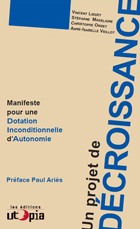1- Revalorise the local initiatives at the social and collective levels and support responsible resources use. Change the relationship between private ownership and distribution of resources. Build a politics of “caring for the territory“ (“ménagement du territoire”) for the benefit of all the people. Improve cooperation between departments/counties/regions.
2- Encourage people to use soft modes of transport (cycling, walking) or public transports by improving the bus services, including school bus services, together with an appropriate fare policy. Improve sidewalks and streets for the disabled people. Create car-share networks. But above all engage in a global reflection about transports as a whole.
3- Develop a biologic agriculture of proximity designed to respect the environment and enrich rural life by designating more arable lands. Implement individual and local autonomy by establishing community gardens and local products distribution networks, through grants to community groups and local councils. Schools to be responsible for the preparation of meals using locally-produced biological products.
4- Embark on programmes of energy consumption reduction in schools, support the local production of energy through the fund established for this purpose: the Energy Fund. Organise for the treatment and recycling of domestic rubbish at the production point.
5- Promote the installation of the Unconditional Autonomy Allowance (UAA) necessarily coupled with a fixed maximum income by making access to public services free of charge: that is social and health services (incorporating preventive medicine), free cultural services: libraries, museums, and staging of historical events together with real policies of support for artists and free access to all to the cultural venues, transports, energy/power supply, water, food, access to property, information and professional formation.
6- Stage departmental conferences about social and ecological innovation with an emphasis on cooperative ventures, shared housing, local and social economy networks, and to determine a maximum income.
7- Re-start a local “production” of goods based on convivial social networks through the creation of local and regional “non-speculative” currencies and LETS (Local Exchange Trading Systems), social commerce/group purchasing (GPO: Group Purchasing Organisations), co-ops, and barter banks.
8- Increase human interactions by improving opportunities for the transmission of traditional local knowledge. Support alternative pedagogies. Increase artistic subjects into school cursus. Support the individual and collective housing initiatives DIY (Do It Yourself) through, among other measures, the Housing Solidarity Fund. (FSL: Fond de Solidarité pour le Logement).
9- Re-orient research and teaching towards an ecological and energentical transition and create networks for food, energy, housing, transports, trades, etc.
10- Re-engage people into participatory democracy processes: forums and debates. Oppose advertising and establish independent local medias, promote investigative journalism.


